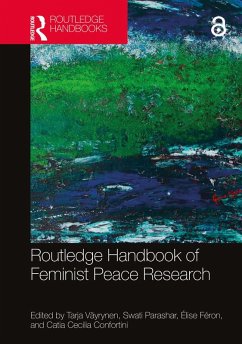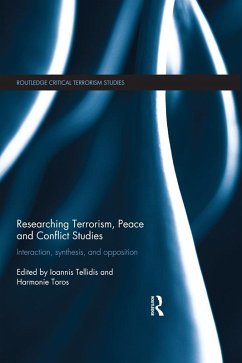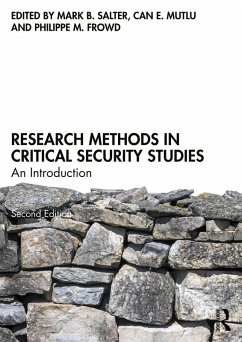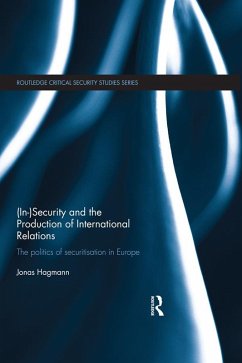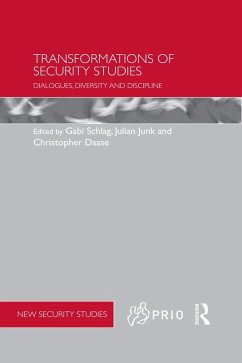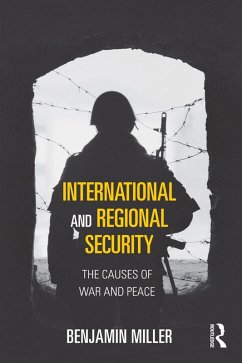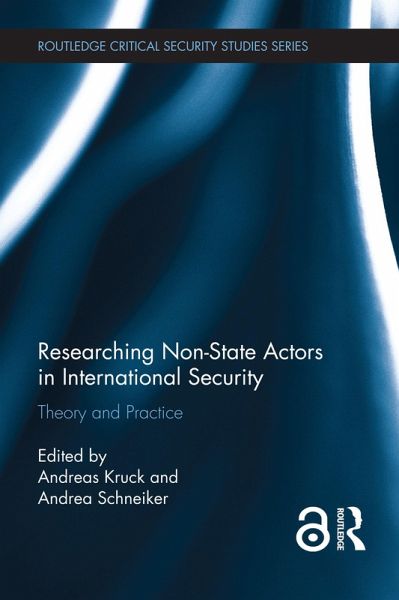
Researching Non-state Actors in International Security (eBook, PDF)
Theory and Practice
Redaktion: Kruck, Andreas; Schneiker, Andrea
Versandkostenfrei!
Sofort per Download lieferbar
0,00 €
inkl. MwSt.
Weitere Ausgaben:

PAYBACK Punkte
0 °P sammeln!
This volume provides researchers and students with a discussion of a broad range of methods and their practical application to the study of non-state actors in international security.All researchers face the same challenge, not only must they identify a suitable method for analysing their research question, they must also apply it. This volume prepares students and scholars for the key challenges they confront when using social-science methods in their own research. To bridge the gap between knowing methods and actually employing them, the book not only introduces a broad range of interpretive...
This volume provides researchers and students with a discussion of a broad range of methods and their practical application to the study of non-state actors in international security.
All researchers face the same challenge, not only must they identify a suitable method for analysing their research question, they must also apply it. This volume prepares students and scholars for the key challenges they confront when using social-science methods in their own research. To bridge the gap between knowing methods and actually employing them, the book not only introduces a broad range of interpretive and explanatory methods, it also discusses their practical application. Contributors reflect on how they have used methods, or combinations of methods, such as narrative analysis, interviews, qualitative comparative analysis (QCA), case studies, experiments or participant observation in their own research on non-state actors in international security. Moreover, experts on the relevant methods discuss these applications as well as the merits and limitations of the various methods in use. Research on non-state actors in international security provides ample challenges and opportunities to probe different methodological approaches. It is thus particularly instructive for students and scholars seeking insights on how to best use particular methods for their research projects in International Relations (IR), security studies and neighbouring disciplines. It also offers an innovative laboratory for developing new research techniques and engaging in unconventional combinations of methods.
This book will be of much interest to students of non-state security actors such as private military and security companies, research methods, security studies and International Relations in general.
The Open Access version of this book, available at https://www.routledge.com/Researching-Non-state-Actors-in-International-Security-Theory-and-Practice/Kruck-Schneiker/p/book/9780367141561, has been made available under a Creative Commons Attribution-Non Commercial-No Derivatives 4.0 license.
All researchers face the same challenge, not only must they identify a suitable method for analysing their research question, they must also apply it. This volume prepares students and scholars for the key challenges they confront when using social-science methods in their own research. To bridge the gap between knowing methods and actually employing them, the book not only introduces a broad range of interpretive and explanatory methods, it also discusses their practical application. Contributors reflect on how they have used methods, or combinations of methods, such as narrative analysis, interviews, qualitative comparative analysis (QCA), case studies, experiments or participant observation in their own research on non-state actors in international security. Moreover, experts on the relevant methods discuss these applications as well as the merits and limitations of the various methods in use. Research on non-state actors in international security provides ample challenges and opportunities to probe different methodological approaches. It is thus particularly instructive for students and scholars seeking insights on how to best use particular methods for their research projects in International Relations (IR), security studies and neighbouring disciplines. It also offers an innovative laboratory for developing new research techniques and engaging in unconventional combinations of methods.
This book will be of much interest to students of non-state security actors such as private military and security companies, research methods, security studies and International Relations in general.
The Open Access version of this book, available at https://www.routledge.com/Researching-Non-state-Actors-in-International-Security-Theory-and-Practice/Kruck-Schneiker/p/book/9780367141561, has been made available under a Creative Commons Attribution-Non Commercial-No Derivatives 4.0 license.
Dieser Download kann aus rechtlichen Gründen nur mit Rechnungsadresse in A, B, BG, CY, CZ, D, DK, EW, E, FIN, F, GR, HR, H, IRL, I, LT, L, LR, M, NL, PL, P, R, S, SLO, SK ausgeliefert werden.




